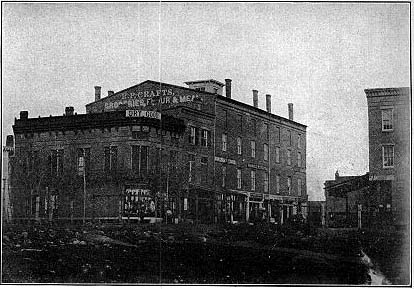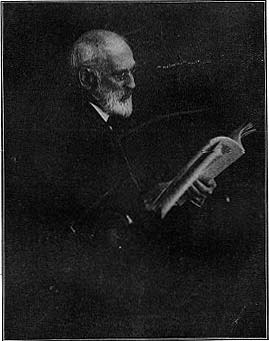|
Sketch of Holyoke by George H. Allyn, page 11 C.W. Ranlet was, for many years, the watchdog of the treasury, a position for which nature admirably fitted him. He was a thorough economist, a caustic talker and even more caustic writer. Some of his annual reports used to arouse the rage of the municipal finance and city property committees. The unfortunate tax collector in those days used to have to account for every dollar of taxes assessed and not rebated, whether he collected them or not, and such was their dread of Mr. Ranlet's bitter tongue (and they had to deposit in his bank) that some of them would discount a personal note and turn in the balance of taxes due the city, collecting them afterwards as they could, but silencing Mr. Ranlet's malevolent remarks. In 1877 William Whiting built the Windsor Hotel and block and the Opera House. This last was opened in April, 1878, and the writer attended the second performance, given by the Leland Opera House Company. The play was "London Assurance," and the future famous actress, Ada Rehan, was an understudy with the part of Grace Harkaway, Mrs. J.W. Albaugh (May Mitchell) starring as Lady Gay Spanker. For many years Holyoke saw the best actors in the country, Barrett, Davenport, T.W. Keene, Frank Mayo, F.S. Chanfran, Barney McCauley, Genevieve Ward, Mary Anderson, Ristori, Januscheck, Kate Claxton, John A. Stevens, John E. Owens, William Warren, and a host of others appearing. The Holyoke Choral Union used to render cantatas, and in "Beishazzar," Dr. Gardner Cox made a superb monarch, and Mrs. A.L. Shumway a stately and majestic queen.
 Exchange Hall (Burned in the 70's.)
Lyceum debates were held in the vestry of the Second Congregational Church, the vestry entrance being on High street, and the reader may well believe that W. S. Loomis, J.L.R. Trask, H.A. Chase, David Stratton, and others used to make the fur fly. With the development of the "Manchester Ground" section a bus line was run by James F. Allyn and S.J. Hobbs for many years, but the service was necessarily rather unsatisfactory. A nephew of H.A. Pratt was the first driver and Richard Bissonette and George Blanchard each officiated for many years. In 1878 John Cleary bought the High street lot (where J.G. Barnes had for years had a paint shop) preparatory to erecting a block. Mr. Barnes had owned the lot since 1855. In 1870 R.P. Crafts had built the three-story block on High, north of Lyman street, and a little later John Delaney built the large block just north. The Allyn brownstone front blocks, on the east side, were built in 1871, and the present Caledonian building by R.P. Crafts in 1874. Dr. John J. O'Connor built the then considered palatial block at the corner of Dwight and Maple streets, in 1873. The splendid Parr and Skinner manufactories located here in 1874, and William Skinner's house was taken from Skinnerville and rebuilt in its present location. William A. Chase had succeeded to the management of the Holyoke Water Power Company, and boomed the city with all his . The Holyoke National bank had been organized in 1872, and prospered from the start. Of the original directors only George W. Prentiss and J.G. Mackintosh remain. In 1881 Leander Davis and J.S. Carr built on Dwight street, nearly opposite the City hall, and Potvin & Kinney built in 1882-83. Dickieson & Dempster had a dry goods store in the Windsor building, and E.A. Penno & Co. a big grocery. H.C. Smith had succeeded C.B. Harris in the clothing business, and also located in the Windsor building. C.B. Harris was a strong character in the early 70's, most successfully conducting the store where James F. Jess now is. He was an infinite wag, and at one time gave an organ grinder a dollar to play before the new Hadley Falls bank, built in about 1870, and thought for some years to be "the last word" in an elegant banking house. President Ranlet came out in high dudgeon, and, after a bitter altercation, drove him away. He and several kindred spirits one day stole the entire stock of butter belonging to David Judd, an honest farmer, who left his team under the Holyoke House shed, and then informed him that such a party was guilty, and that they proposed to give him an informal trial in the hotel. C.B. Harris presided as judge, and his rulings were most judicial, till interrupted by some of the gang bombarding him with the stolen balls of butter, when he declared the trial adjourned and paid Mr. Judd twice the value of his produce. We carelessly omitted mention of Sam King, the only active, surviving merchant of those engaged in business on High street in the late 60's. Not one of the others but has passed from the street. Sam would doubtless indignantly deny our rash statement that David Adler antedated him, and, in fact, we can't tell which was the pioneer. The first directory, published in 1869, gives both, and though "Sam" claims he came in 1867, the honors are easy. Sam was always thrifty and gained fame in the late 80's by stopping a run on the Holyoke Savings bank, offering to buy all books at a slight discount. No sane human being could conceive of "Sam's" taking any chance, and the run stopped in short order.
 Stephen Holman.
Holyoke's Oldest Living Manufacturer. There were two branches of Fenian societies here in 1869, and before the Fenian raid up into Canada 'tis said a meeting was held at the Holyoke House to outline the campaign and divide the spoils. It was planned to wrest old Ireland from the hated Briton's grasp and divide it up among the faithful. The father of V.J. O'Donnell and "Old Man Wright," father of J.H. Wright (familiarly known in Holyoke's earlier years as "Cap" Wright), are said to have apportioned the province, but the deal had a bad hitch and never matured. General Sweeney, a Civil war veteran, was to command the forces, and quite a fund was raised; but no fallen Fenian warriors sleep in St. Jerome s cemetery, which was laid out about this time. "Cap" Wright served several terms in the Legislature and owned the block at the corner of High and Lyman streets, recently known as Dufresne's. C.A. Corser was defeated at one time for a re-election to the state Senate because of a speech on woman suffrage, in which he made some strictures in foreign immigration which were distorted. He was succeeded by "Deck" Hitchcock, who will be recalled by many of the old-timers. "Deck" was a big-hearted fellow and a great horse-lover. He had a specially fine pair of blacks, which he wagered he could drive down the precipitous, steep bank south of the Sacred Heart Church, and would probably have done so had not his opponent backed down. C.E. Ball was one of the most prominent druggists of the 70's, and continued in business until he sold out to Hall & Lyon, in 1908. Joel Russell established the J. Russell Company hardware store back in the early 60's, making, perhaps, the oldest store conducted by the same family in the city, as it antedated the Sears' store nearly ten years, and even takes precedence of Sam King. James Fitzgerald established the Fitzgerald Newsrooms in the early 70's, being first located on Hampden street, and later in Orrel's block. James Fitzgerald was even more free from indecision of opinion than Daniel F. and no one ever had much difficulty in finding where they stood on matters by inquiry, though they were never "butters-in."
| Previous Page | Next Page |
| People & Organizations | Allyn's Sketch of Holyoke |
| Selected Advertisments | Churches | Surname Index |
© Laurel O'Donnell 1996 - 2005, all rights reserved
This document may be downloaded for personal non-commercial use only and should not be reproduced or distributed without permission. |